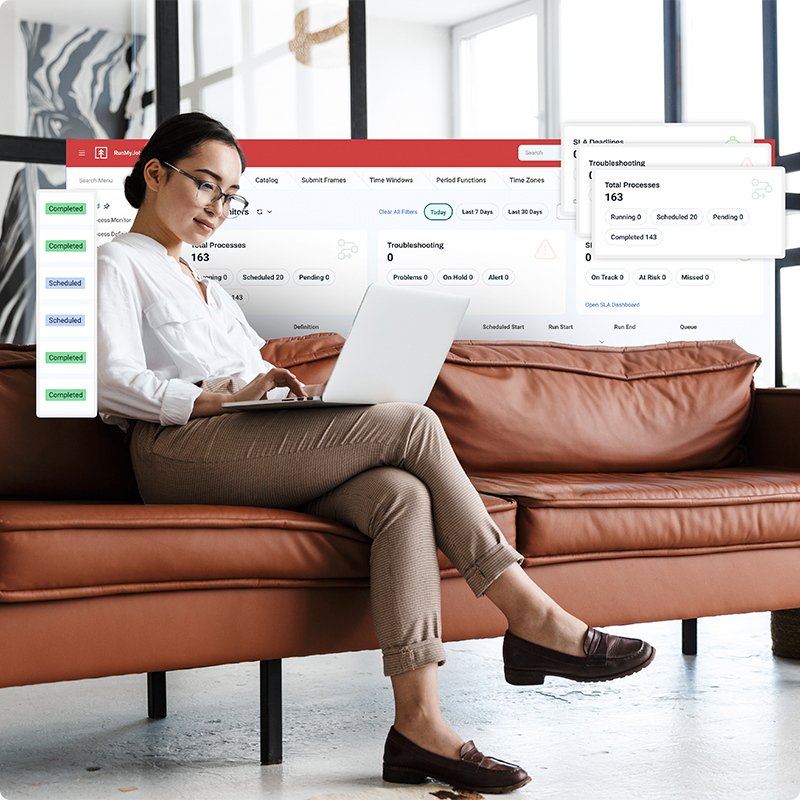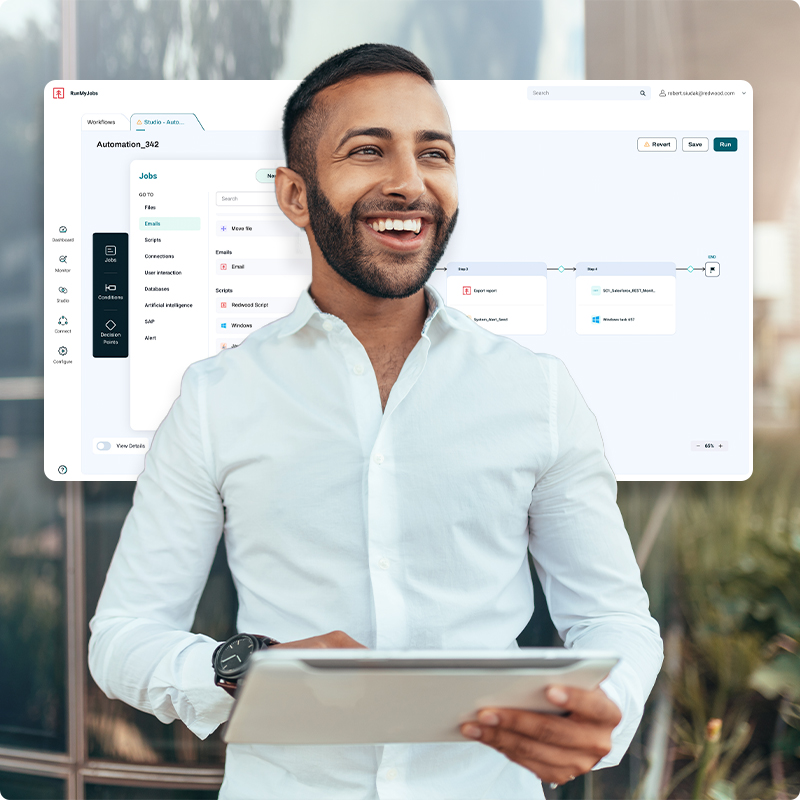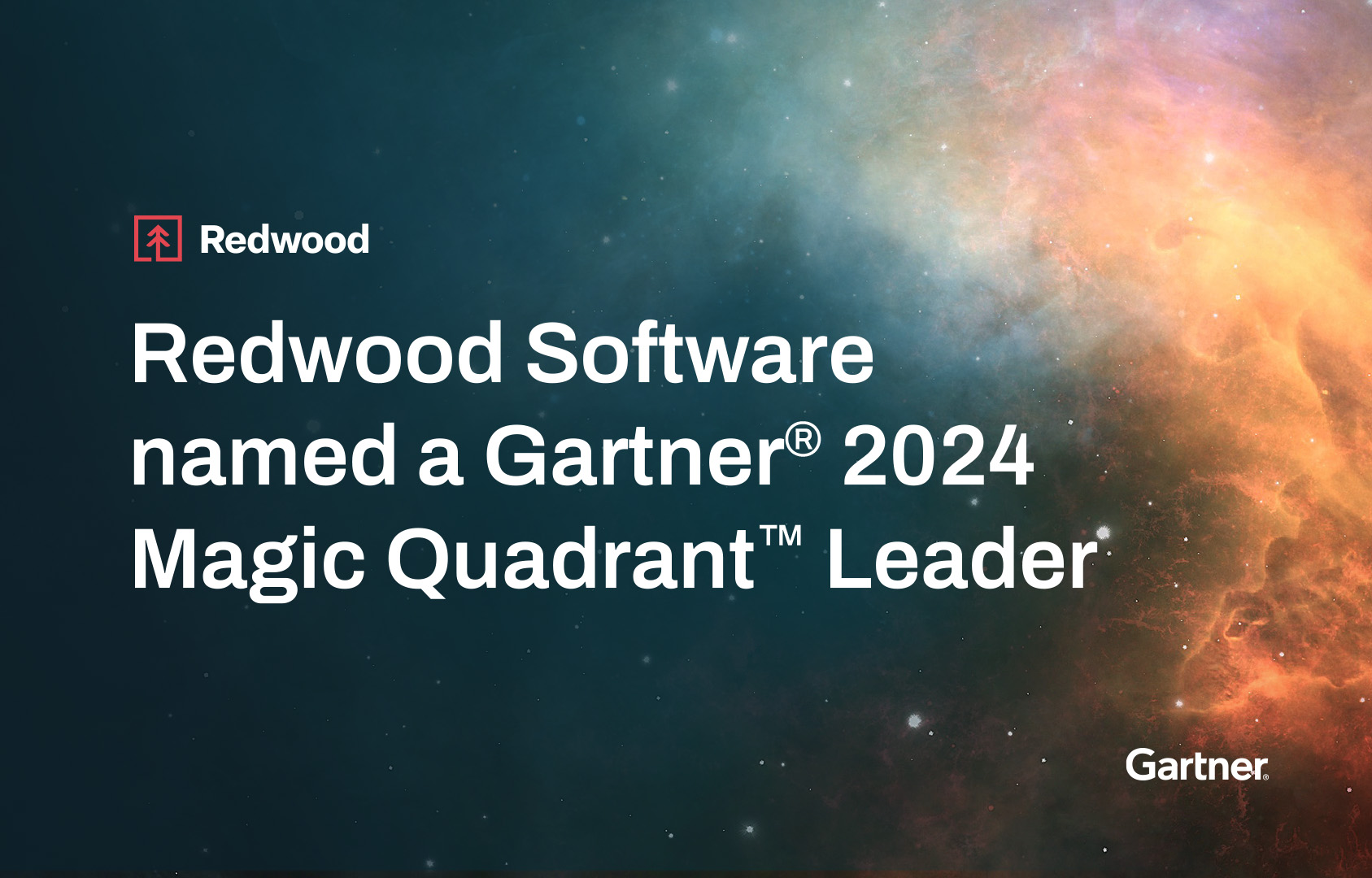Reliable orchestration for automation tools, business processes and data sources
RunMyJobs by Redwood is a unified, cloud-native Service Orchestration and Automation Platform (SOAP) that coordinates applications, processes and data to drive mission-critical business outcomes

Transforming automated processes for the enterprise
RunMyJobs provides cloud-native workflow orchestration and process automation with a system- and host-independent design.
-
True SaaS
Get the flexibility of hybrid-ready, agentless and bi-directional integrations, and minimize custom code with a comprehensive connector library and no-code UI.
-
Frictionless integration
Orchestrate critical processes with native integration of key enterprise applications and systems: SAP and Oracle ERPs, supply chain, data management, AI and more.
-
Broad observability
Get actionable insights for proactive improvements, visualizations and analysis — not just incident management, plus performance and SLA dashboards engineered for SOAP.
-
Customer focus
Enjoy a white-glove experience — from migration through user education, Redwood Software delivers a comprehensive, unique experience.
-
Dynamic scheduling
Take advantage of event-driven automation to adapt your automations to real-time conditions, maximize reliability and velocity and boost ROI.
-
AI support
Use embedded intelligent assistants to save hours in build and run-time for learning, troubleshooting and workflow design.

Experience the ease of modern workload automation (WLA)
Help your teams automate any IT workload from end to end. A workload automation solution for your mission-critical business outcomes, RunMyJobs is the first SaaS composable platform built for ERP.
It has the capabilities and features to automate any IT workload, involving everything from infrastructure hygiene tasks to complex, human-in-the-loop processes.

Compose, control and connect your workflows
With advanced integration capabilities, you get frictionless connectivity and build a unified automation fabric, no matter how complex your IT landscape.
RunMyJobs easily orchestrates end-to-end workflows with event-driven automation that gives your team visibility into every business process — real-time monitoring from a single pane of glass.

Simplify data management activities
Improve visibility and gain more control over growing data volume and complexity for better business outcomes.
RunMyJobs automates the scheduling, execution and monitoring of data pipeline tasks to deliver reliable and timely end-to-end data pipeline operations.

Empower business and IT users
Provide all users the access and feature set to develop and execute specially selected workloads and workflows, meticulously governed by the IT organization.
RunMyJobs features a self-service automation portal that empowers users with enhanced autonomy, flexibility and speed. They can independently initiate predefined processes, customize parameters and execute task sequences.

Accelerate DevOps with advanced automation
Give your IT teams actionable information for continuous deployment with enhanced automation, orchestration and monitoring capabilities.
RunMyJobs seamlessly integrates with various continuous integration and delivery (CI/CD) tools and offers real-time monitoring and notifications for DevOps workflows.

Go beyond traditional monitoring
Make faster decisions and turn insights into action with optimal context and ample information.
The RunMyJobs user experience reduces ambiguity, helping you understand status and performance quickly. Advanced monitoring and observability features are integrated across the entire automation lifecycle, from design-time to run-time.
Modernize your IT infrastructure with RunMyJobs
Eliminate manual effort and boost workload performance.
-
Automation for anything
Connect all your systems and data, from on-premises mainframes to cloud services and apps.
-
Jobs-as-code development
Define, deploy and manage workflows through code for greater flexibility.
-
Event-driven automation
Easily create and orchestrate critical business processes to achieve desired outcomes faster.
-
Built-in generative AI
Reduce manual effort with AI-driven automation and intelligent job scheduling.
-
Data pipeline support
Improve data quality and enhance scalability in your enterprise with fast, accurate data automation.
-
Resource provisioning
Centralize control — create and manage resources across on-premises and cloud-based systems.
Migration made easy
Redwood’s migration experts have migrated hundreds of leading companies using tested tools and a proven migration strategy. Build your team’s confidence and skills by working alongside workload automation experts throughout the process.
Service Orchestration and Automation Platforms FAQs
What are Service Orchestration and Automation Platforms?
Service Orchestration and Automation Platforms (SOAPs) are tools designed to automate and manage complex IT processes. They integrate various IT systems, applications and services, enabling seamless communication and task execution. These platforms provide a unified interface to automate workflows, manage dependencies and streamline operations across diverse environments, including on-premises, cloud and hybrid infrastructures. Key functionalities often include API integration, workload automation and managed file transfer, facilitating efficient IT service delivery and digital transformation.
SOAPs are essential for IT operations, as they enhance the coordination of automation tasks across multiple systems and applications. They support automation strategies by providing tools to manage ETL processes, digital infrastructure and DevOps initiatives. They also enable infrastructure and operations (I&O) leaders to achieve cost savings and improve operational efficiency. By leveraging SOAPs, organizations can ensure that their IT processes are aligned with business services, promoting agility and customer-focused innovation.
Learn more about SOAPs and how they help support business agility and digital innovation.
What is the difference between orchestration and automation?
Automation refers to the execution of individual tasks without human intervention. It involves using tools and scripts to perform specific actions, such as running a script to back up data or deploying a software update. Automation focuses on repetitive, single-purpose tasks, ensuring they are completed efficiently and accurately within IT environments.
On the other hand, orchestration involves coordinating and managing multiple automated tasks to achieve a broader objective. It’s about integrating various automation tasks across different systems and applications to create a cohesive workflow. For example, orchestration tools can automate the entire lifecycle of a business process, from initiating data transfers between cloud-native infrastructure and data centers to executing machine learning models and updating databases. This holistic approach enhances IT operations and supports digital business initiatives by providing a unified view and control over complex processes.
Read about workflow orchestration and automation and how to modernize batch processing.
What is an orchestration platform?
An orchestration platform is a tool designed to coordinate and manage complex IT processes across various systems and applications. It integrates multiple automation tasks, enabling them to work together in a cohesive workflow. These platforms are essential for handling diverse IT environments, including cloud, on-premises and hybrid infrastructures, by providing a unified interface for managing and automating workflows.
Orchestration platforms support IT automation by ensuring that different components work in sync, such as AWS, big data applications and operating systems. They help infrastructure and operations teams optimize resources, improve efficiency and achieve customer-focused agility. Everyday use cases include automating business processes, managing dependencies in data workflows and supporting workload automation solutions.
Learn about workload automation trends according to Gartner.
Get to know modern WLA
Read more about how to achieve true orchestration.



